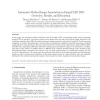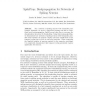1047 search results - page 108 / 210 » Learning the required number of agents for complex tasks |
PRL
2008
13 years 7 months ago
2008
In this paper, the automatic medical annotation task of the 2007 CLEF cross-language image retrieval campaign (ImageCLEF) is described. The paper focusses on the images used, the ...
AIED
2009
Springer
14 years 2 months ago
2009
Springer
Design of collaborative learning (CL) scenarios is a complex task, but necessary if the goal of the collaboration is learning. Creating well-thought-out CL scenarios requires exper...
ACG
2009
Springer
14 years 2 months ago
2009
Springer
Evaluating agents in decision-making applications requires assessing their skill and predicting their behaviour. Both are well developed in Poker-like situations, but less so in mo...
ESANN
2000
13 years 9 months ago
2000
Abstract. For a network of spiking neurons with reasonable postsynaptic potentials, we derive a supervised learning rule akin to traditional error-back-propagation, SpikeProp and s...
ATAL
2005
Springer
14 years 1 months ago
2005
Springer
Efficient coordination among large numbers of heterogeneous agents promises to revolutionize the way in which some complex tasks, such as responding to urban disasters can be perf...


